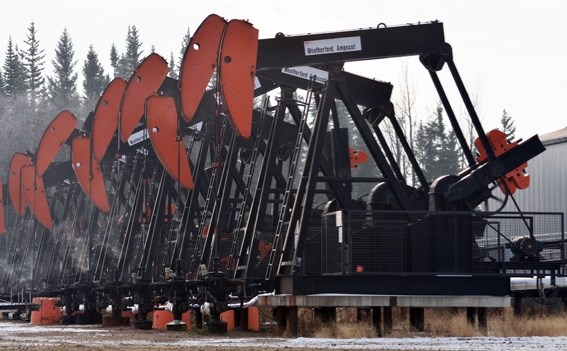The oil and gas sector took a major hit in 2015 and, while people kept waiting for it to rebound, it was never able to climb back up.
Starting in late 2014, the price of a barrel of oil started steadily declining – a trend that continued on and amplified in 2015. Early on in the year, the panic started for those close to the oil and gas industry as the once booming sector started to dip below the $50 per barrel mark.
In April, motorists were starting to see the prices at the pumps inch their way back up again, but experts knew even at the time it wouldn't last.
“The market tends to over react when something happens, like what happened last fall. So prices could rise up to $55 or $60 per barrel, I can't see them going up to $90 or $100 for a while,” said Alan MacFayden, Associate Professor Emeritus at the University of Calgary, back in April.
As predicted, mid-summer the prices of crude oil rose above $60 per barrel for a short time before taking a plummet once again. Major oil and gas companies were cutting jobs and reducing hours, causing hardship for many industry-reliant communities across the province.
In June, the Alberta unemployment rate sat at 5.7 per cent, up from the 4.5 per cent in January. By October, that number had risen to 6.6 per cent. As of November, the province's unemployment rate had jumped to 7 per cent – an increase of almost 10 thousand more unemployed Alberta residents over October.
Recently, Cenovus Energy Inc., one of the largest producers in the region, announced it will cut spending by 19 per cent in 2016 with Foster Creek seeing a 12 per cent decrease. Prior to that, in November, Devon Energy cut 200 jobs as part of a 15 per cent reduction to their Canadian workforce. Twelve employees were laid off from the Bonnyville office.
According to data from the provincial government, as of the end of November, altogether in Alberta there had been 114 group layoff notices, affecting 18,006 workers. That's a drastic increase over the 11,694 workers that were impacted by layoffs in all of 2013 and 2014.
Following the NDP's rise to power in Alberta, instead of lessening the blow of a hurting energy sector, the new provincial government caused more fear among those in the industry. The concerns stem from the introduction of a new carbon tax and royalty review.
“We should be supporting our oil and gas right now more than ever and by throwing havoc into this – those two important ones are the environmental review and the royalty review, by (the government) putting them off during this important time is (costing) us jobs in Bonnyville – Cold Lake,” said Bonnyville – Cold Lake MLA Scott Cyr back in September.
The provincial government is in the process of conducting a royalty review, but have committed to leaving the current framework in place until the end of 2016.
In late November, the NDPs introduced their climate change plan. Included in the plan is the implementation of a carbon tax, which will see industry held responsible for the carbon emissions they produce. In 2017, companies will be charged $20 per tonne, the fee will increase to $30 per tonne in 2018.
“Premier Notley has outright said that she is not going to bring in a Provincial Sales Tax, but this is a PST,” said Cyr. “This is going to affect everybody. It doesn't matter if you are a senior. It doesn't matter if you are disabled, if you a middle-income or low-income earner or a single mother. This affects everybody.”
Things aren't looking to get any better for the industry in the coming year. Hopes that the oil prices would rebound soon are long extinguished as the price of a barrel of crude oil dropped to below $35 per barrel on Dec. 21 – within a few cents of the lowest point it's ever been since the 2009 recession.



